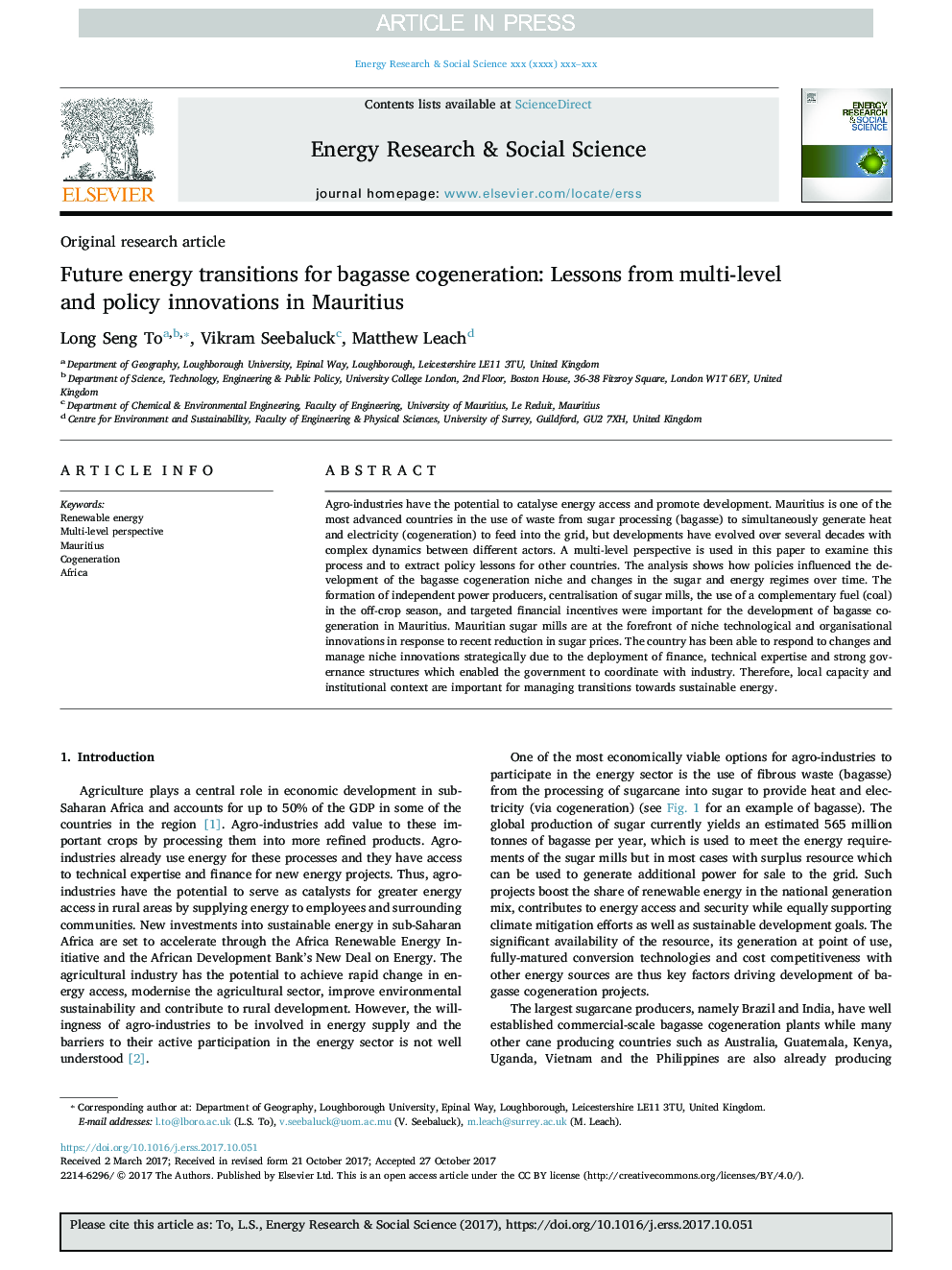| کد مقاله | کد نشریه | سال انتشار | مقاله انگلیسی | نسخه تمام متن |
|---|---|---|---|---|
| 6557757 | 1422566 | 2018 | 10 صفحه PDF | دانلود رایگان |
عنوان انگلیسی مقاله ISI
Future energy transitions for bagasse cogeneration: Lessons from multi-level and policy innovations in Mauritius
ترجمه فارسی عنوان
انتقال انرژی های آینده برای تولید کودهای باگاس: درس های نوآوری چند سطح و سیاست در موریس
دانلود مقاله + سفارش ترجمه
دانلود مقاله ISI انگلیسی
رایگان برای ایرانیان
کلمات کلیدی
انرژی تجدید پذیر، چشم انداز چند مرحله ای، موریس، همگام سازی، آفریقا،
ترجمه چکیده
صنایع کشاورزی دارای توان بالقوه برای دسترسی به انرژی و ترویج توسعه هستند. موریتیوس یکی از پیشرفته ترین کشورهای استفاده از زباله از فرآوری قند (باگاس) است تا همزمان تولید گرما و برق (همگن سازی) را برای تغذیه به شبکه، اما تحولات در طی چند دهه با دینامیکی پیچیده بین بازیگران مختلف تکامل یافته است. چشم انداز چند سطحی در این مقاله برای بررسی این فرآیند و استخراج درس های سیاسی برای سایر کشورها مورد استفاده قرار می گیرد. تجزیه و تحلیل نشان می دهد که چگونه سیاست ها بر توسعه توزیع کودهای باگاس و تغییرات در رژیم های قند و انرژی در طول زمان تاثیر گذاشته است. شکل گیری تولید کنندگان مستقل قدرت، تمرکز تولید شکر، استفاده از سوخت مکمل (ذغال سنگ) در فصل خارج از محصول و ایجاد انگیزه های مالی هدفمند برای توسعه تولید کودهای باگاس در موریس مهم بود. تولید کنندگان قند موریس در مقابله با نوآوری های تکنولوژیک و سازمانی طاقچه در پاسخ به کاهش اخیر قیمت قند هستند. این کشور به دلیل استقرار مالی، تخصص فنی و ساختارهای حکومتی قوی که به دولت اجازه داد تا با صنعت هماهنگ شود، به تغییرات پاسخ داد و نوآوری های طرز کار را به طور استراتژیک مدیریت کرد. بنابراین، ظرفیت محلی و زمینه سازمانی برای مدیریت انتقال به سوی انرژی پایدار مهم هستند.
موضوعات مرتبط
مهندسی و علوم پایه
مهندسی انرژی
انرژی (عمومی)
چکیده انگلیسی
Agro-industries have the potential to catalyse energy access and promote development. Mauritius is one of the most advanced countries in the use of waste from sugar processing (bagasse) to simultaneously generate heat and electricity (cogeneration) to feed into the grid, but developments have evolved over several decades with complex dynamics between different actors. A multi-level perspective is used in this paper to examine this process and to extract policy lessons for other countries. The analysis shows how policies influenced the development of the bagasse cogeneration niche and changes in the sugar and energy regimes over time. The formation of independent power producers, centralisation of sugar mills, the use of a complementary fuel (coal) in the off-crop season, and targeted financial incentives were important for the development of bagasse cogeneration in Mauritius. Mauritian sugar mills are at the forefront of niche technological and organisational innovations in response to recent reduction in sugar prices. The country has been able to respond to changes and manage niche innovations strategically due to the deployment of finance, technical expertise and strong governance structures which enabled the government to coordinate with industry. Therefore, local capacity and institutional context are important for managing transitions towards sustainable energy.
ناشر
Database: Elsevier - ScienceDirect (ساینس دایرکت)
Journal: Energy Research & Social Science - Volume 35, January 2018, Pages 68-77
Journal: Energy Research & Social Science - Volume 35, January 2018, Pages 68-77
نویسندگان
Long Seng To, Vikram Seebaluck, Matthew Leach,
